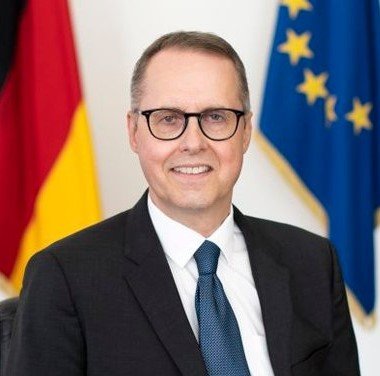In a recent statement, German Ambassador to Georgia, Peter Fischer, firmly addressed allegations that the European Union (EU) finances terrorism. Speaking at a press conference, Fischer emphasized the EU’s commitment to peace and security, and categorically denied any involvement in funding terrorist activities. His remarks come in response to growing concerns and misinformation regarding the EU’s financial aid and its impact on global security. Fischer’s statement aims to clarify the EU’s position and reassure the public of its dedication to combating terrorism.
Ambassador Fischer’s Clarification
Ambassador Peter Fischer took a strong stance against the allegations, stating unequivocally that the EU does not finance terrorism. He highlighted the EU’s rigorous financial oversight mechanisms designed to prevent any misuse of funds. Fischer explained that all financial aid provided by the EU is subject to strict monitoring and auditing processes to ensure it is used for its intended purposes. These measures are in place to maintain transparency and accountability in all EU-funded projects and initiatives.
Fischer also pointed out that the EU has a long-standing commitment to supporting peace and stability worldwide. He emphasized that the EU’s financial aid programs are aimed at promoting development, humanitarian assistance, and economic growth in various regions. The ambassador underscored that any claims suggesting the EU’s involvement in financing terrorism are baseless and unfounded. He urged the public to rely on verified information and not be swayed by misinformation or propaganda.

The ambassador’s statement was well-received by the audience, who appreciated the clarity and transparency provided. Fischer’s remarks are expected to alleviate concerns and reinforce the EU’s reputation as a responsible and ethical global actor. The EU’s commitment to combating terrorism and ensuring the proper use of its financial resources remains unwavering, as reiterated by Ambassador Fischer.
EU’s Financial Oversight and Accountability
The EU has established comprehensive financial oversight mechanisms to ensure that its funds are used appropriately and effectively. These mechanisms include stringent auditing processes, regular monitoring, and thorough evaluations of all funded projects. The EU’s financial aid programs are designed to support development, humanitarian efforts, and economic stability in various regions, with a focus on transparency and accountability.
Ambassador Fischer highlighted the importance of these oversight mechanisms in preventing any misuse of funds. He explained that the EU works closely with international organizations, governments, and local partners to implement its aid programs. This collaborative approach ensures that funds are directed towards legitimate and impactful initiatives. Fischer emphasized that the EU’s financial aid is intended to support positive change and development, not to fund terrorism or any other illicit activities.
The ambassador also addressed the role of independent auditing bodies in maintaining the integrity of the EU’s financial aid programs. These bodies conduct regular audits and evaluations to verify that funds are being used as intended. Fischer assured the public that any discrepancies or irregularities are promptly addressed, and corrective measures are taken to prevent future occurrences. The EU’s commitment to financial transparency and accountability is a cornerstone of its aid programs.
Addressing Misinformation and Building Trust
Ambassador Fischer’s statement also focused on the importance of addressing misinformation and building trust with the public. He acknowledged that misinformation can spread rapidly and create unnecessary fear and confusion. Fischer urged the public to seek information from credible sources and to verify the accuracy of any claims before accepting them as truth. He emphasized the role of the media in disseminating accurate information and countering false narratives.
Fischer’s remarks are part of a broader effort by the EU to combat misinformation and promote transparency. The EU has implemented various initiatives to enhance public awareness and understanding of its policies and programs. These initiatives include public information campaigns, educational programs, and partnerships with local media outlets. The goal is to provide the public with accurate and reliable information about the EU’s activities and to build trust in its institutions.
The ambassador’s statement is expected to have a positive impact on public perception and trust in the EU. By addressing the allegations head-on and providing clear and transparent information, Fischer has reinforced the EU’s commitment to ethical and responsible governance. The EU’s efforts to combat terrorism and ensure the proper use of its financial resources are integral to its mission of promoting peace, stability, and development worldwide.
